I am anti-imperialist
I have been fighting imperialism all my life. As a kid, along with my family I protested the Vietnam War. As a young adult I left the country entirely, becoming an anthropologist and cultural activist in Mexico, working with others for access to knowledge and recognition of poor people’s creativity and power. I also joined the international community of solidarity with the struggles to end US-supported dictatorships in South and Central America. Back in the States I marched against Iraq Wars I and II, and protested the invasion and occupation of Afghanistan, the blockades of Cuba and Venezuela, the expansionist warmongering of US-led NATO.
I’ve worked for fair treatment of immigrants, who, after all, come to this country because the economies and social fabrics of their own countries are decimated by a cruelly unequal system dominated by the very country to which they find themselves forced to flee. I’ve participated actively in local and broader-ranging groups fighting racism and poverty.
And I have been part of the multitudes around the globe, including so many in this very belly of the beast, who protest the US-backed Israeli slaughter of Gaza and the widening escalation in the region being waged in our name because we’re denizens of the empire.1 2
But have I also internalized imperialist patterns?
The country I was born into, the United States of America, has been dominating, bullying, and exploiting the world for many, many decades. I hate that we have been at war nearly every year of its existence, and that its boot print on the planet is so heavy, pervasive, and contrary to the will of most people everywhere. I am ashamed that people look upon us with fear, envy, and head-shaking disbelief as we swashbuckle our way through the world as if we own it, imperiling the entire planet for self-centered interests.
I cannot escape the fact that I grew up as a child of an imperialist power and undoubtedly inherited and internalized the patterns of that power. Not those of the rulers, per se, but those instilled in the denizens of the empire to ensure that I—like the rest of us—play my part in supporting it. My choice to oppose imperialism has no doubt made me more aware of this dynamic, but merely becoming conscious of it is far from sufficient to free me from its grip. People brought up in an oppressor role—as male, White, cis-gender, able-bodied, or any dominant role—internalize patterns of thought, feeling, and behavior that further this role, believing themselves better, more powerful, and entitled to superior rights and privileges.
Even if our values and principles are entirely opposed to supremacist attitudes and behaviors, the systems we are born and raised in, including imperialism, inevitably condition us to function as part of them. These systems survive precisely because they do that.
What does “internalized imperialism” look like?”
A quick search for “internalized imperialism” turns up many entries for “internalized colonialism.” As described by Franz Fanon and others, that refers to colonized, subordinated groups absorbing and acting out negative attitudes towards themselves and subservient attitudes toward their colonizers, partly to cope with their subjugation and partly because it’s hard not to internalize relentless invalidation of oneself and one’s people.
Yet I found almost no reference to attitudes internalized by the direct and indirect perpetrators and beneficiaries of imperialism, analogous to attitudes internalized by people socialized into other dominant roles. Maybe people have written about it under other names, but I find it noteworthy that compared to other forms of supremacy, the consequences we might expect from internalizing US supremacy as denizens of empire get little mention.
The mentality of bullies is well studied. That of people who actively help or passively stand aside when observing others being oppressed has also been explored, particularly in regard to extreme situations such as in Nazi Germany. But I have not heard or seen much analysis about the effects of being part of, reaping the fruits of living in, the wealthiest, most aggressive and dominating nation in the world.
As the juggernaut of empire rampages around the globe, what happens to our minds, bodies, and connections to others as we’re slammed and banged around inside it? How have we been anesthetized to the unbearable acts we’re part of committing?
Being used to bash the world is bad for us
Without consult or consent, our resources, our names, our selves, are continually deployed to wage war and to impose sanctions, occupations, coups, and other forms of coercion. Picture being grabbed by your feet and wielded like a police baton to beat up on the world.
Being on the receiving end of the imperialist stick is much more damaging and painful, of course, but being used to beat up on others will inevitably affect our heads and cause serious internal injuries to our very humanity.
What exactly are these injuries? How do I recognize and resist them?
Probing internalized imperialism
Right now I’m just asking questions. My hypothesis is that being denizens of empire, living as we do in the belly of the beast we’re working to transform, has serious consequences for us.
In upcoming posts I plan to delve into what this looks like for US3 activists, our culture, and our work.
Writing While the World Burns
I create essays about aspects of activist culture and work on my serial novel, Rainwood House Sings. I also sing, cook, eat, read, walk, kayak, watch TV series with my daughter, and hang out with friends and family.
As I do these things, a relentless message gnaws at my mind. It whispers, and often growls or screams, that I should instead be spending all my waking hours (and many sleeping ones) organizing and fighting for justice, peace, and planetary survival—especially now when all three are under such threat.
This gnawing voice tries to make me feel that I am writing while the world burns. It is a feeling common among folks in the progressive community. We often feel powerless and conflicted about living a regular, comfortable life in the midst of disaster and suffering. This note says a bit more about this challenging feeling in our activist culture, including this song that beautifully expresses it.
In short, we face the question, how to do what I can—and is that the same as doing what I must?—in the midst of such disasters, yet also get on with life in a healthy way? It’s a conundrum that feels particularly sharp in these times of shocking, reckless war-making and existential threats.
As with the internalized imperialism question above, I am poking into corners and crevasses in the belly of the beast, looking for answers.
A year of genocide and resistance
This past year many of us have focused in on the resistance of the people of Palestine. That resistance has unfolded in different forms since the mid-twentieth century, but this year, October 7, 2023-October 7, 2024—it intensified a thousandfold. On October 7 of last year the people of Israel saw their military invincibility shattered, with the most Israeli deaths ever sustained in one attack. Under the immensely disproportionate Israeli retaliation, the people of Gaza have endured a year of intensive daily bombardments and systematic destruction of every aspect of their lives and society, an assault which Israel appears bent on increasing and expanding.
In the course of this year the movement for justice and peace in this region to end this occupation and genocide, grew exponentially.
For my part, as an anti-imperialist denizen of the US I participated with many others in demanding the US change its policies and stop supporting the Israeli government’s campaign to destroy Gaza. I wrote a number of articles about this struggle, specifically about being a Jew opposing genocide, which you can find in the section of this newsletter entitled Not In My Name.
Vigil at the University of Maryland
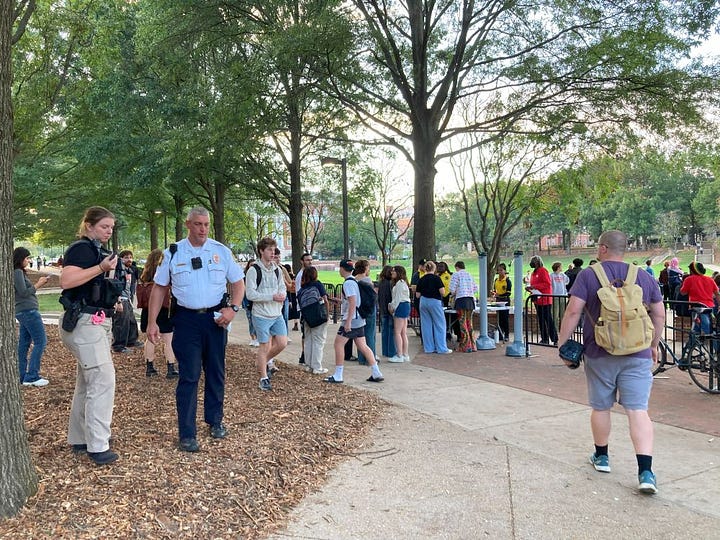
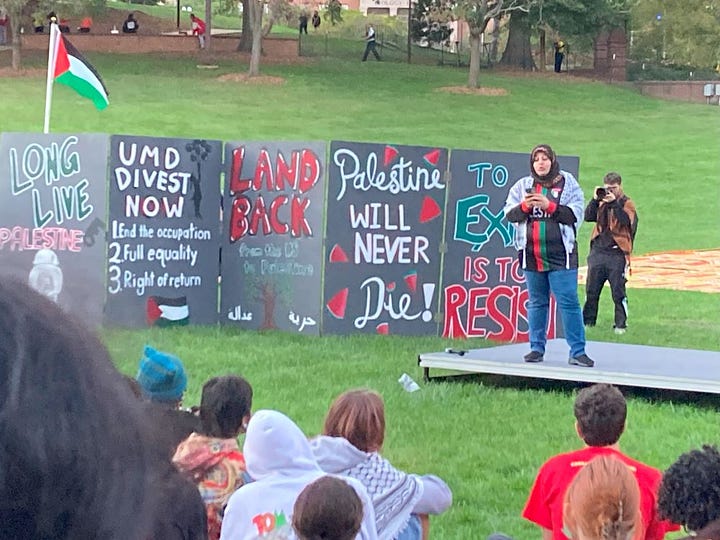
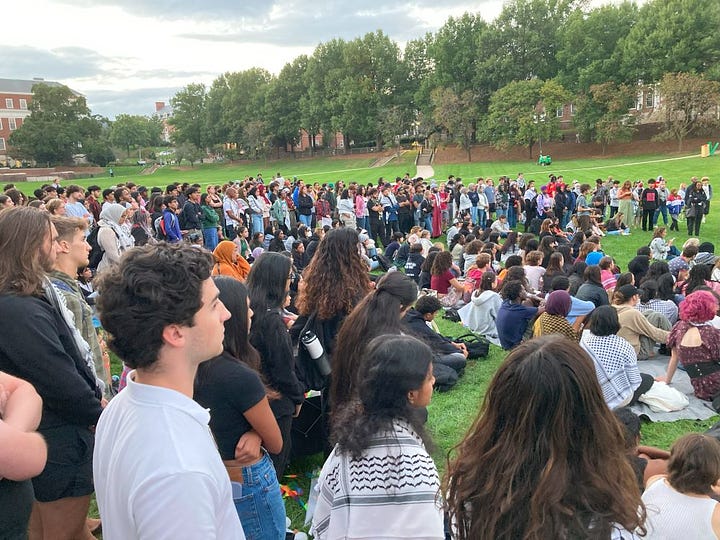
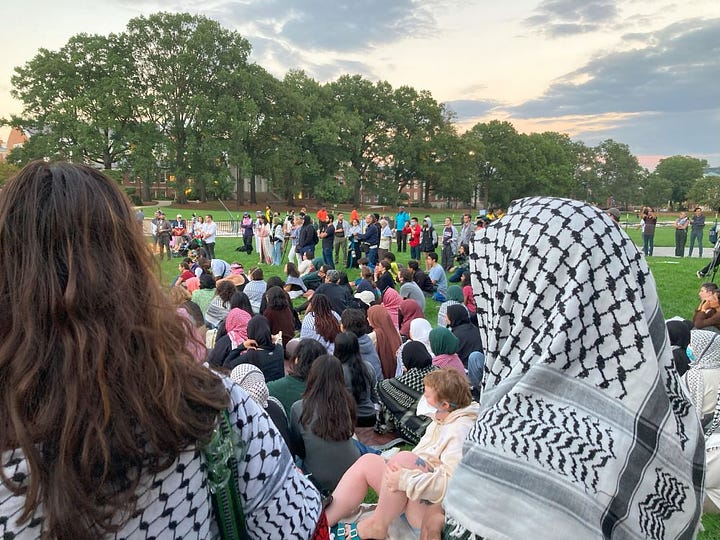
On October 7, my family and others in our local activist group, now called PGCounty4Palestine (referring to the Maryland county where we live) participated in a vigil at the University of Maryland.
The event drew together a large crowd of students, faculty and community members to honor the past year’s suffering and resistance, and to condemn US-supported Israeli genocide against the people of Palestine, while praying for peace, justice and safety for Jews and Palestinians, who must find a solution together as equals.
The students also stressed their demand for the US to halt arms and other support for Israeli occupation and genocide, and that their University divest from its participation in such support.
That this vigil happened at all is due to the persistence of the UMD chapter of Students for Justice in Palestine (SJP), which sued the university for free speech violations after the event was cancelled by the Administration. The students won the right to hold the vigil, though they did have to put up a $2,500 bond—quite a hardship for a group of students. They were not allowed to use a sound system, making it hard for the large crowd to hear. Also, the university erected barricades and fencing around the lawn (the same lawn that, as it happens, gets a brief mention in the first chapter of Rainwood House Sings).
Despite going through checkpoints, a bag search, and having to prove I had a right to attend as a community member of this public university, it was an inspiring if somber ceremony, with poetry and the reading of names of the dead.
I prefer to say ‘denizens’—people who reside in this country—rather than ‘citizens,’ to skirt distinctions and disparities associated with citizenship. When I say “us” I mean activists whose lives are physically based in the US.
Israel is the direct perpetrator, but on a personal level we all understand that the person who arms and abets the murderer is as complicit as the one who pulls the trigger, especially when the entity arming and abetting the perpetrator has overwhelming, imperial, power. And we know that claiming neutrality or expressing mild wishes for the murderer to stop, while continually sending more arms and blocking all genuine attempts to stop violence, is an inadmissible means of evading responsibility.
The US is far and away the dominant empire, but activists of Europe and other countries historically and currently dominating and exploiting others must also reckon with their own internalized imperialism.

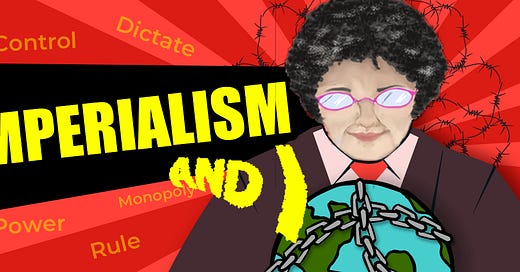




That is a great article. You listing of your anti-imperialist actions was very useful to me in thinking about my work in this area as well. I am looking forward to you expanding on what it means to carry internalized imperialism in ourselves. As a young person, I could not conceive of being anything but an "American". I suspect that is part of poison that lurks in the recesses of my psyche.
Putting politics primary can be done in many ways, from cooking, writing, visiting, building friendships while discussing politics and organizing struggles. Those with less oppressive lives don't benefit from imperialism; it's no privilege to live in a racist, divisive society. Knowing people who do helps us know the world and surmount these barriers, but it's not easy.